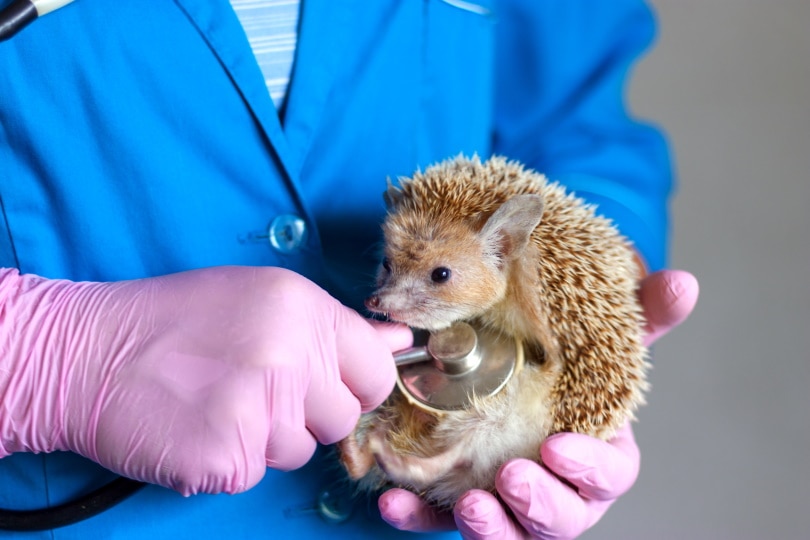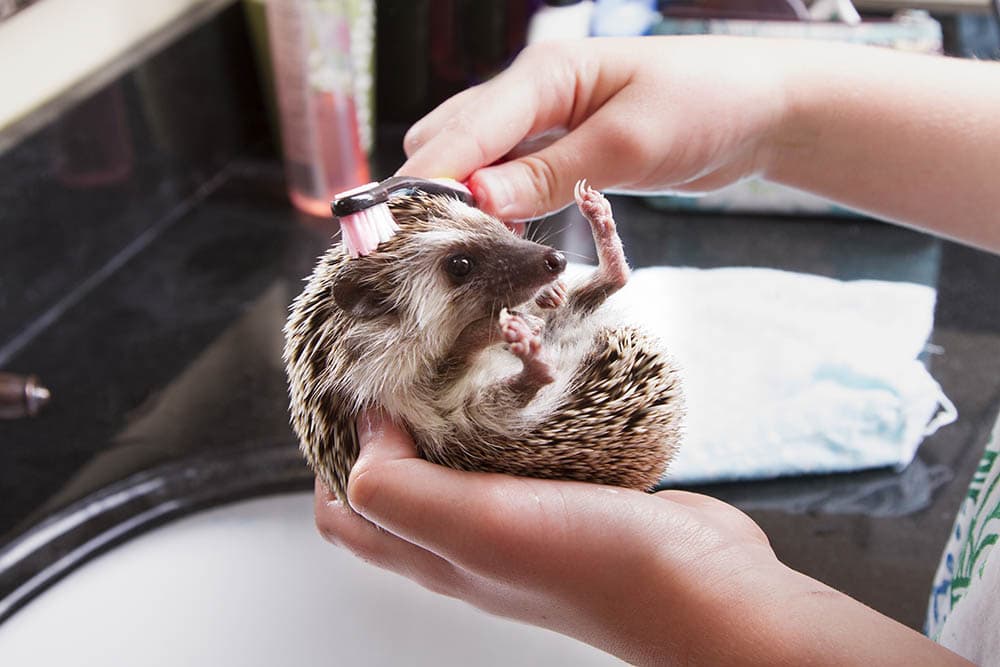
Hedgehogs are unique companions that require detailed care and attention. For devoted owners, catering to their specific needs can be a very rewarding experience. When your prickly pal is acting off, however, determining what might be going on can be stressful. As with many animals, hedgehogs will often hide signs of illness until they are very sick—making prompt identification of concerning symptoms essential. The following guide will discuss the signs that your hedgehog may be sick, as well as common causes for their symptoms.
The 9 Signs To Look For In a Sick or Dying Hedgehog
1. Anorexia
Anorexia, or loss of appetite, is a concerning symptom in hedgehogs. Hedgehogs are nocturnal, and therefore will do most of their eating at night. They should be offered a high-quality hedgehog-specific food, which can be supplemented with small amounts of insects, fruits, and vegetables. If you notice that your hedgehog is eating less or stops eating altogether, a prompt visit to the veterinarian is warranted. Prolonged anorexia can lead to weight loss and malnutrition—and a very sick hedgehog. Anorexia may be a symptom of many different diseases in hedgehogs, including the following:
Dental disease is a common problem seen in hedgehogs. Periodontal disease, tooth fractures, dental abscesses, and excessive wearing of the teeth are all specific dental issues that can lead to anorexia and weight loss. A diagnosis of dental disease is made based on an oral exam and radiographs. Treatment for these conditions may involve the extraction of affected teeth, antibiotics, or changes in diet. The prognosis for affected hedgehogs depends on the specific issue present, however is generally favorable.
2. Nasal Discharge
Clear, colored, or blood-tinged nasal discharge in hedgehogs all require further evaluation by a veterinarian. Nasal discharge may be the only symptom noted in a sick hedgehog, or it may occur in conjunction with other respiratory symptoms such as sneezing, difficulty breathing, and increased respiratory noise. Nasal discharge may also present with lethargy and anorexia depending on the underlying disease that is present.
Respiratory tract infections, including pneumonia, are seen frequently in hedgehogs. Factors that may predispose hedgehogs to develop respiratory infections include low environmental temperatures; fragrant, dirty, or dusty bedding; or a compromised immune system. Specific pathogens that have been implicated in causing respiratory disease in hedgehogs include Bordetella, Pasteurella, and Corynebacterium. Your veterinarian may recommend radiographs, blood work, or a bacterial culture to diagnose a respiratory infection. Treatment involves broad-spectrum antibiotics, as well as fluids, oxygen therapy, and nebulization as needed for more serious cases. It is also essential that any husbandry issues, such as unsuitable bedding, be corrected. The prognosis for respiratory infections is variable, and prompt diagnosis and treatment will lead to the best outcome for your hedgehog.
3. Skin Abnormalities
Crusting, loose quills, quill loss, or scratching are all signs that your hedgehog may have a dermatologic disease. Additionally, non-specific signs such as lethargy or decreased appetite may also indicate a skin condition is present. If you notice any skin abnormalities in your hedgehog further evaluation is needed by a veterinarian to differentiate between the following possible conditions:
Acariasis is the most common dermatopathy seen in hedgehogs. Frequently implicated in an infestation is Caparinia tripolis, a psoroptic mite. Diagnosing acariasis involves mite identification on a skin scraping or impression smear. Medications used to treat mite infestation in hedgehogs include either selamectin or ivermectin, however, proper cleaning and disinfection of your hedgehog’s cage will also be an important part of treatment recommended by your veterinarian. Thankfully, with appropriate treatment, the prognosis for hedgehogs with acariasis is good.

4. Hematuria
Hematuria, or having blood in the urine, is another concerning sign of illness in hedgehogs. A change in urine color may be subtle, however, a more obvious reddish color may also be noted. Along with hematuria, straining to urinate, increased frequency of urination, lethargy, or inappetence may also be noted.
Unfortunately, neoplasia is very common in hedgehogs. Uterine tumors are often responsible for hematuria, vaginal bleeding, and weight loss. Diagnostic imaging such as ultrasound or radiographs, as well as blood work, may be considered by your veterinarian for further evaluation of hematuria. These tests may also help determine prognosis once a uterine tumor has been diagnosed. Ovariohysterectomy may allow for extended survival times in hedgehogs with uterine tumors.
5. Diarrhea
Soft, runny, bloody, or watery stool in hedgehogs should be further investigated by a veterinarian. Diarrhea may indicate a problem within the gastrointestinal tract, however, it is also possible that diarrhea is occurring secondary to a problem elsewhere in the body.
Salmonellosis (an infection with Salmonella bacteria) is an important disease of pet hedgehogs, as it is considered zoonotic—meaning it can be transmitted to people. While many hedgehogs with Salmonella have diarrhea, this condition may also present with weight loss, decreased appetite, lethargy, and dehydration. It is also possible for hedgehogs infected with Salmonella to be asymptomatic (without symptoms). Fecal culture is used to diagnose salmonellosis, and antibiotics may be used to treat symptomatic animals. To reduce the risk of disease transmission, proper hygiene, including frequent hand washing is essential when handling infected hedgehogs. Limited information is available regarding the prognosis for clinical salmonellosis in pet hedgehogs.
6. Tumors
Growths or swellings are unfortunately likely to represent cancer in pet hedgehogs. Neoplasia is very common in hedgehogs and has been reported in almost every body system. While tumors are a more obvious sign of cancer, non-specific signs such as lethargy and weight loss are also frequently noted in affected hedgehogs. A wide range of tumor types has been reported, with the most common including:
Oral Squamous Cell Carcinoma (SCC) is the most common growth in the mouths of pet hedgehogs. It is typically noted in the back of the mouth and is very locally invasive, leading to facial swelling, tooth loss, gingivitis, and decreased appetite. A definitive diagnosis of oral SCC can be made with biopsy and histopathology. Treatment for neoplasia in hedgehogs often includes surgical excision, however, the location and degree of invasion of oral SCC may preclude this treatment option and lead to a poor prognosis.
7. Lethargy
Lethargy is a non-specific sign of illness that is often seen in pet hedgehogs. Lethargic hedgehogs may lose interest in their normal activities, have less energy, eat less, or sleep more than usual. Changes to your hedgehog’s energy level require further evaluation by a veterinarian. It is likely that diagnostic testing will be recommended, to help differentiate between the many potential causes of lethargy:
Hepatic lipidosis is a condition in which lipids accumulate within the liver, impairing its normal function. This disease process occurs commonly in hedgehogs and can be seen secondary to anorexia (especially in obese hedgehogs), infectious disease, and neoplasia among other conditions. Symptoms include lethargy, inappetence, icterus, diarrhea, and neurologic signs. Your veterinarian may recommend blood work and radiographs to aid in diagnosing hepatic lipidosis. There is no specific treatment for this condition in hedgehogs; intensive supportive care and identification of a primary disease process are needed to guide treatment. Little information is available on the prognosis for hedgehogs affected by hepatic lipidosis, and the outcome may in part be determined by the underlying disease that is present.

8. Ataxia
Ataxia, or impaired coordination, always requires a prompt assessment by a veterinarian. An ataxic hedgehog may have difficulty getting around their enclosure, eating and drinking, and keeping themselves clean.
A significant, and unfortunately fatal cause of ataxia in hedgehogs is Wobbly Hedgehog Syndrome (WHS). Additional signs of WHS include the inability to roll into a ball, stumbling, weight loss, seizures, and progressive paralysis. A suspected diagnosis of WHS can be made based on physical exam findings and clinical signs, however, a definitive diagnosis cannot be made until a necropsy examination is performed after death. The prognosis for WHS is poor, with death from the disease typically occurring within 18-25 months after clinical signs are noted.
9. Difficulty Breathing
Any time a pet is having difficult or labored breathing, they need to be seen by a veterinarian immediately—hedgehogs are no exception. Abnormal respiratory rate or respiratory noise (wheezes, harsh, or musical breath sounds) may also be noted in hedgehogs, and may be indicative of the following:
Cardiomyopathy is a common finding in pet hedgehogs, most frequently affecting hedgehogs greater than 3 years of age. The cause of cardiomyopathy is unknown; however, is suspected to have a genetic or nutritional basis. In addition to difficulty breathing, hedgehogs with heart disease may be lethargic or suffer from weight loss. Your veterinarian may diagnose cardiomyopathy based on physical exam findings, radiographs, an electrocardiogram, or an echocardiogram. Veterinary drugs used for heart failure may help treat cardiac disease in hedgehogs, however, the long-term prognosis for this condition is poor.
Conclusion
Caring for your hedgehog and watching them grow can be a fun, fulfilling experience. Careful attention to their personality quirks and routines is a joy of pet ownership; however, may also help identify when something is amiss. Knowing the signs of illness to watch for and what they might mean will help you to provide the best care possible for your pet hedgehog.
Featured Image Credit: ALIAKSANDR PALCHEUSKI, Shutterstock








